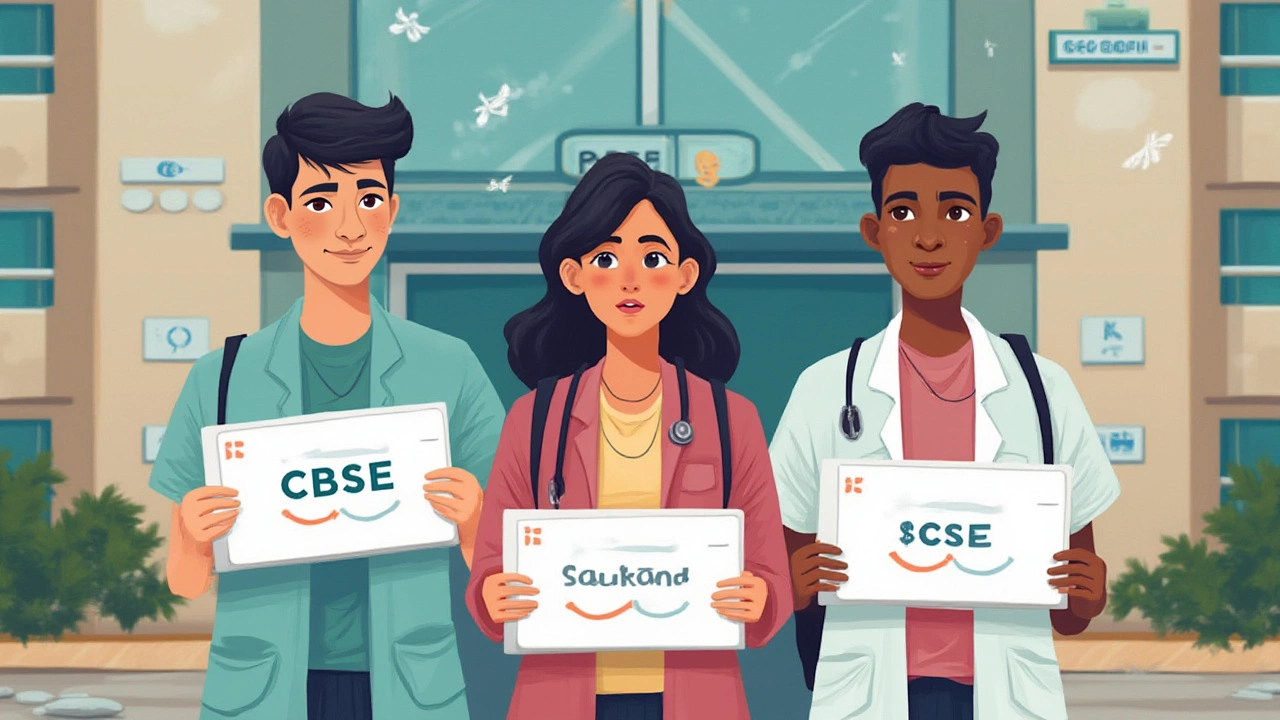Google the phrase “best board for becoming a doctor” and you’ll find endless debates, passionate opinions, and truckloads of misinformation. The truth? The answer isn’t as black and white as some make it out to be, and the choice you make today could set the tone for your entire journey into medicine. Still, this isn’t about picking a “superior” label for bragging rights—it’s about understanding what each board really offers, how it can make or break your NEET score, and where you’ll feel most at home while pounding through those thick biology books.
How Your Board Impacts Your Path to Medicine
Every year, thousands of ambitious teenagers (and their parents) lose sleep over which school board gives them the best shot at a medical seat in India. The classic match-up always pits CBSE, ICSE, and State Boards against each other. Let’s talk about why this decision matters. First off, the medical entrance test—NEET (National Eligibility cum Entrance Test)—draws most of its syllabus from the CBSE curriculum, especially the NCERT textbooks. No secret there. According to the NTA, which conducts NEET, the vast majority of questions—around 80-85%—are lifted directly from the NCERT biology, chemistry, and physics texts for classes 11 and 12. It’s no surprise then that CBSE students tend to feel more comfortable tackling NEET’s multiple-choice barrage.
Still, that doesn’t mean an ICSE or State Board student is at some huge disadvantage from day one. What matters more is how you prepare. ICSE has a bit more emphasis on in-depth understanding and English proficiency but it covers many topics in greater detail. Some might say this trains students to handle complex medical concepts later, though, ironically, ICSE’s expansive syllabus can make NEET prep a race against time. State Boards? They differ wildly from state to state—Maharashtra, Tamil Nadu, Karnataka, and Andhra Pradesh all have their quirks. But across the board, their syllabus rarely matches the NEET exam blueprint as closely as CBSE’s does.
There’s also the daily grind. CBSE schools are everywhere, found even in the smallest towns. They organize regular mock tests and offer NEET-oriented coaching within the classroom. Plus, switching schools mid-stream—say, if your parents relocate to another city—is less of a headache with CBSE. But don’t discount the State Boards: some of them run top-tier schools and have produced their share of ace medical students. The flexibility with regional languages can be a big comfort for students not fluent in English. Yet, you’ll often hear that CBSE’s pedagogy is more exam-oriented and directly relevant for medical aspirants.
So, if your endgame is a seat in MBBS or BDS via NEET, CBSE does have a track record of producing more toppers. According to a NEET 2024 stats review:
| Board | NEET Qualifiers (%) | Top 500 Rank Holders |
|---|---|---|
| CBSE | 62 | 292 |
| ICSE | 19 | 63 |
| State Boards | 19 | 145 |
But these numbers don’t tell the whole story. Motivation, consistency, and coaching matter as much, if not more. You’ll find medical toppers from every board, from remote Nagaland to bustling Mumbai, so don’t buy into the myth that your board dooms or defines your chance at a white coat. What your board does shape is your daily workload, comfort with the language of exams, and familiarity with the NEET syllabus style.

CBSE, ICSE, State Board—A Real-World Breakdown
Let’s break things down further. CBSE, or the Central Board of Secondary Education, follows a syllabus that’s almost copy-pasted into the NEET exam paper. Most major NEET coaching institutes, like Allen and Aakash, base their prep material on the CBSE/NCERT blueprint. Even the illustrations and examples in the CBSE books reappear in NEET, sometimes with barely any changes. For this reason alone, a lot of kids in classes 11 and 12 switch from their State Board or ICSE schools to a CBSE one. This jump isn’t always easy. Students often stumble over the rapid-fire teaching style, the sheer volume of mock tests, and questions that care less for rote learning and more for rapid problem-solving.
ICSE, or the Indian Certificate of Secondary Education, stands out for its thoroughness. The curriculum digs deep, covering even the tinier branches and roots of a concept. This can be a double-edged sword. You’re better prepped for medical studies in the long term, but you might need to set aside extra hours to focus solely on NCERT-style notes for NEET. Some ICSE students feel they spend too much time on English and elective subjects, leaving less time for focused NEET prep. On the upside, those who survive ICSE’s rigour rarely struggle with medical college’s intense workload later.
State Boards have serious highs and lows. Some, like Tamil Nadu’s, are praised for their robust science foundation up to class 10 but then drop off in 11 and 12, sticking to a syllabus that feels outdated compared to CBSE. Others, like Maharashtra State Board, align a bit better with NEET but may not go as deep as CBSE does. State Board textbooks often use simpler language, which helps some students grasp the basics quickly, but the leap to NEET’s level of questioning can be a rude shock.
Cost is another factor. State Board schools, especially government-run ones, are generally far cheaper than most CBSE or ICSE institutions. With many families spending big on NEET coaching on the side, this can make a real difference. It’s also worth looking at class size. CBSE schools usually have larger batches, while State Board ones sometimes offer more personalized attention—not always, but often enough to matter.
Keep in mind, if you stick with State Board, be ready to supplement your textbooks with NCERT ones, because NEET doesn’t “respect” your local board’s syllabus. The top NEET scorers always crosscheck what’s missing and fill in the gaps, regardless of their starting point. ICSE students find this out the hard way, having to buy a fresh set of NCERT books just for entrance prep. Some join special “bridge courses” that target the CBSE/NCERT content directly.
On talking to a bunch of current medicos in Adelaide—yes, there are plenty who came from every board you can name—the biggest regret I hear loud and clear is, “I wished I had started reading NCERT in class 9.” The earlier you get familiar with the NEET language, the less panicky you’ll feel as exam season ramps up.

Tips for Medical Aspirants: Making the Most of Your Board
All this board talk isn’t meant to spook you. No matter where you start, you can reach your medical dream. But a few tricks can ease that journey. First and foremost, if you’re serious about NEET (or any medical entrance), make the NCERT textbooks your best friend. Highlight, annotate, revise—and don’t just skim. Even students from ICSE or State Boards need to do this, since around 80% of NEET biology questions come straight from these books. Don’t ignore diagrams, tables, or those “extra fact” boxes—questions love hiding there.
Next, find a coaching system that suits your pace and style. Just because everyone’s running to giant names like Allen and Resonance doesn’t mean they’re the only way. Lots of toppers do well with local classes or online resources, as long as they stick to a schedule. Practice NEET mock tests in real exam conditions—no phone, no shortcut, strict timer. Mess up now so you don’t freeze up when it counts.
If you’re from ICSE or State Board, compensate early for any syllabus mismatch. Compare your subject list with the NEET outline, and don’t be shy about asking teachers for help with NCERT portions your board doesn’t cover. There are WhatsApp groups, Telegram channels, and even Instagram pages dedicated to “NEET missing chapters for XYZ Board”—use these. If your school doesn’t run NEET awareness sessions, rope in seniors who cracked it before you. Their hacks and notes are gold.
Don’t get caught up in “English-medium vs local language” debates. Yes, NEET is offered in regional languages, but the core books, the best-prepared guides, are usually in English or Hindi. If you’re shaky in either, work on it early—don’t leave language skills for the last mile. This is doubly true if you’re aiming for centrally run medical colleges (like AIIMS Delhi) where English is the teaching language.
Mental health gets ignored way too much in the chase for a medical seat. Board selection pressure, relentless coaching, and high parental expectations can work together to burn you out. Keep an eye on how you feel, not just how you’re scoring on weekly tests. It’s not weak to step back sometimes or to admit you need a break.
Here’s a quick checklist you can use, no matter which board you’re in:
- Read all NCERT books for your subjects, especially biology, chemistry, and physics
- Regularly practice NEET mock tests—online or offline
- Compare your board’s syllabus with the NEET syllabus and fill in the gaps early
- Join a study group, coaching class, or online resource if you’re struggling with any portion
- Revise diagrams, tables, and fact boxes; they are question magnets
- Work on your language skills—don’t let English or Hindi stand in the way
- Stay in touch with teachers, seniors, and NEET toppers from your school
- Pace yourself, don’t let burnout creep in, and keep your motivation high
Your school board is just the starting line, not the finish. Most NEET toppers swear the “secret sauce” was dogged determination, relentless practice, and a stubborn refusal to quit. The best board for becoming a doctor is the one that pushes you ahead but doesn’t drown your spark. For many, that’s CBSE. For others, it could be ICSE, a State Board, or even a shift to open schooling if life throws curveballs. What really counts is what you do with what you’ve got, and how early you start tailoring your study habits to match the medical entrance exam grind. Start early, use every resource, and remember—it’s not about the board, it’s about the boarder.
